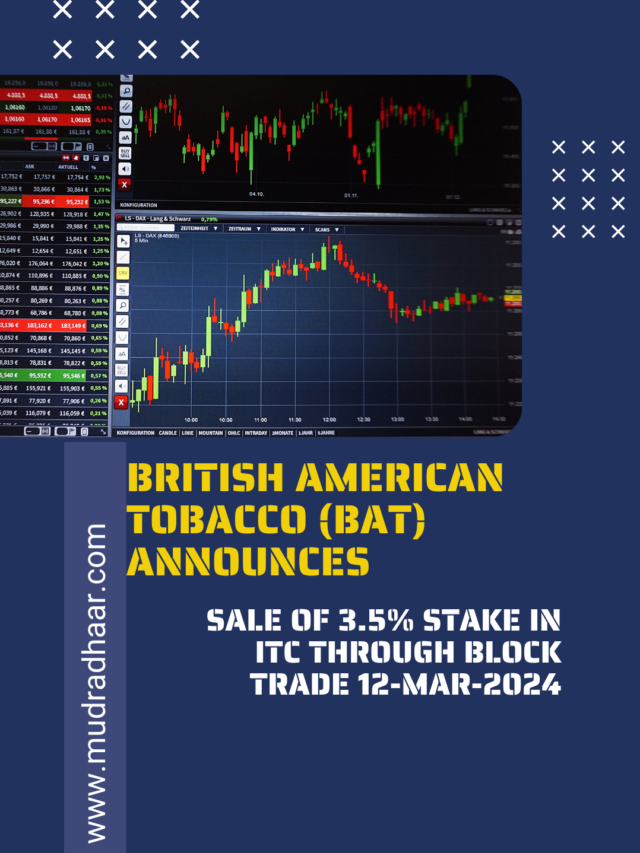British American Tobacco (BAT) has made headlines in the financial world with its recent decision to divest a portion of its stake in ITC Ltd., one of India’s leading conglomerates. As per data from the Bombay Stock Exchange (BSE), British American Tobacco (BAT) currently holds a substantial 29.03% stake in ITC, spanning from cigarettes to hotels, through three of its entities. However, following the block trade, BAT’s ownership in the Indian conglomerate is set to decrease to 25.5%.
In a statement released on 12-Mar-2024, Tuesday, British American Tobacco (BAT), listed on the London Stock Exchange, announced its intention to divest a portion of its stake in ITC Ltd. The company plans to sell up to 43.68 crore shares to institutional investors through an accelerated book-build process.
What does BAT offer?
According to a report, the manufacturer of Lucky Strike cigarettes, British American Tobacco (BAT), aims to raise up to $2.1 billion through the block trade. The offering comprises shares priced in the range of ₹384 to ₹400.25 per share. Notably, this price range reflects a 5% discount to the current market price (CMP). The transaction is estimated to be valued at approximately ₹16,775 crore. As part of the offering, BAT has imposed a lock-in period of 180 days, during which the company will abstain from any further selling of its stake in ITC. This strategic move underscores BAT’s efforts to optimize its investment portfolio and generate liquidity while affirming its commitment to the long-term prospects of ITC.
British American Tobacco (BAT) highlighted the significance of its partnership with ITC, describing it as a valued associate operating in an attractive market with substantial long-term growth potential.
Tadeu Marroco, CEO of British American Tobacco (BAT), expressed confidence in the future prospects of ITC under its current management. In a statement, Marroco affirmed his belief that ITC will persist in generating value for its shareholders. He also reiterated BAT’s commitment to maintaining its significance as a shareholder in ITC, expressing anticipation for ITC’s continued growth journey.
Marroco emphasized that through this transaction, British American Tobacco (BAT) aims to expedite the initiation of a sustainable buyback program. Additionally, it allows BAT to maintain its focus on deleveraging, targeting a new range of 2-2.5 time-adjusted net debt/adjusted EBITDA. As a result of the share sale, the weight of ITC in the Nifty 50 Index is expected to increase from its current 3.71%. This strategic move not only aligns with BAT’s financial objectives but also holds implications for the broader market dynamics.
This decision marks a significant development in the relationship between BAT and ITC, as well as in the broader landscape of international investments. The block trade, which involves the sale of a large number of securities to institutional investors outside of the open market, reflects BAT’s strategic realignment of its investment portfolio.
ITC, with its diverse business interests spanning from cigarettes to hotels, holds a prominent position in the Indian market. The sale of BAT’s stake comes at a time when both companies are navigating through evolving market dynamics and regulatory changes.
The move by BAT to sell a portion of its stake in ITC could have implications for both companies and their shareholders. While BAT may be seeking to optimize its investment portfolio or generate liquidity for other ventures, the sale presents an opportunity for institutional investors to acquire a stake in ITC, potentially influencing the company’s ownership structure and governance.
It is worth noting that BAT’s decision to sell its stake in ITC comes amidst broader trends in the tobacco industry, including increasing regulatory scrutiny and evolving consumer preferences. As companies adapt to these changes, strategic decisions such as divestments and reallocations of investments become crucial for maintaining competitiveness and sustaining growth.
The announcement of BAT’s divestment in ITC underscores the dynamic nature of global investment strategies and highlights the interconnectedness of multinational corporations in today’s business environment. It also prompts speculation about the future direction of both BAT and ITC, as well as their respective positions in the Indian and international markets.
As the transaction unfolds, market observers will closely monitor the impact of BAT’s divestment on ITC’s share price, as well as any subsequent developments in both companies’ strategies and operations. The sale of BAT’s stake in ITC via block trade represents a significant event in the financial landscape, with implications that extend beyond the realms of tobacco and consumer goods.
In conclusion, BAT’s decision to sell 3.5% of its stake in ITC through a block trade signals a strategic realignment of its investment portfolio and underscores the evolving dynamics of the tobacco industry. As both companies navigate through changing market conditions, the transaction presents opportunities and challenges for stakeholders, shaping the future trajectory of BAT, ITC, and the broader investment landscape.
To open an account with Zerodha and receive 100% reimbursement of account opening charges from me, click here:
For any further queries regarding trading, investments, or other related matters, please feel free to contact us.







